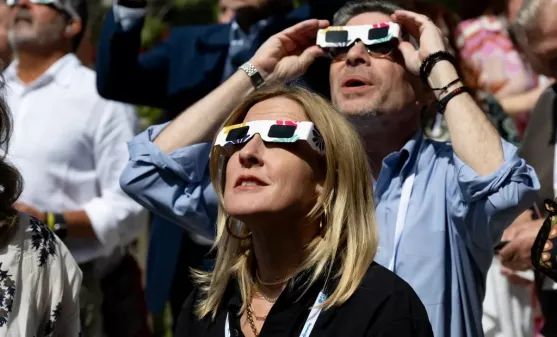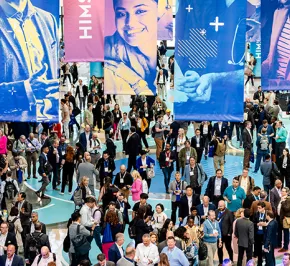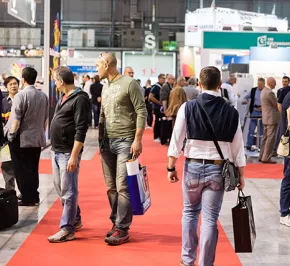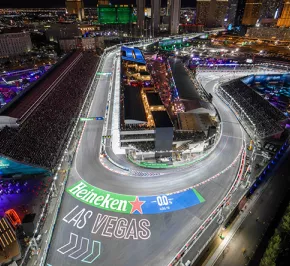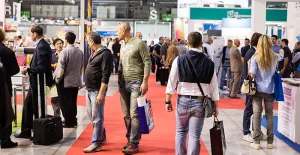Events are a critical part of the corporate ecosystem, and especially the marketing ecosystem. However, as valuable as events are for forming long-term business partnerships and ensuring loyal customers are provided with a unique experience, there are considerations to be made around environmental impact.
On average, event attendees produce over four pounds of waste per day. While event professionals have taken the right steps to reduce their environmental impact, there’s still progress to be made.
While some factors, such as carbon emissions from travel, are difficult to control, there are ways event professionals can mitigate environmental impact — beyond the simple steps of going paperless or giving reusable water bottles as swag while still delivering top-notch experiences.
The industry has the opportunity to do more than eliminate single-use plastics and use digital agendas. Instead, identify new ways to leverage emerging technologies and work with the community around them to help events take a greener approach.
Leveraging Tech
Generative AI is top-of-mind for event professionals. While this technology has its share of environmental impact concerns, AI-powered solutions are inescapable in today’s enterprise. Given its prevalence, teams should look into how the technology can be leveraged to boost sustainability efforts.
AI-powered solutions can be used to assist in reporting on environmental impact. Tools like Gemini or ChatGPT can analyze event data to calculate how small decisions add up to the event’s overall impact, providing decision makers with data to better inform areas of improvement. Certain event technology tools might also have the capability to measure and report on this. Even if sustainability isn’t the event’s primary goal, measuring it is a necessary step to understanding what’s driving environmental impact and how to make adjustments accordingly.
For example, event professionals assume that going paperless reduces significant waste, but they may be overlooking how materials, such as swag items (water bottles, notebooks, etc.), are driving waste instead. AI can support more intentional swag initiatives by using tools to calculate the amount of waste for each item and pairing it with attendee feedback. With a better understanding of waste and what your attendees want at an event, teams can opt for fewer, higher-quality swag items that can reduce overall budget and environmental impact.
Reduce and Reuse
Another opportunity for improved event sustainability is around event designs. With the overall increase in in-person events, teams should start to think of ways to repurpose designs from one event to another. Swag is the perfect way to do this.
Many times, swag items are clearly marked with that particular event’s emblem and year. Instead, teams can make the conscious decision to strategically brand swag items in a way that’s not limited to one individual conference. This can minimize any potential waste from purchasing swag in large quantities. Designing evergreen booth setups and signage are other ways for design elements to be repurposed across multiple events.
Finding the Right Partners
In addition to leveraging AI-powered tools and designing evergreen event elements, it’s important for event organizers to work with partners who take sustainability seriously.
Designing event elements that can be reused isn’t possible without the right partners. Event professionals need to find the right event builders with experience in reusing materials and minimizing waste.
The venue you choose plays a significant role, too. It’s important to understand the venue’s sustainability programs to help you maximize local impact while also reducing additional work to create one-off programs in the event’s host city. For example, as much as you work to plan for maintaining a fair ratio of food-to-attendees without having too much excess, there might still be leftovers. Check with the venue to see if they can work with a local food bank or shelter to share back to the community.
Additionally, after the event concludes, leaders can set up volunteer programs for local clean-up efforts to ensure that attendees are leaving the space greener than when they arrived. These can be built into the schedule as networking events that also work to serve the community, especially considering the sizable impact events on local ecosystems.
Consider Hybrid Options
Events were built on the foundation of in-person connection. However, in recent years we’ve seen the rise of hybrid and virtual events. Offering a virtual component to a conference not only provides an environmentally friendly option but also promotes an inclusive event. Virtual event programs can solve the problem of extending the reach of the event with a minimal increase to the event’s environmental impact. These programs can take place before, during or after the event with a focus on still providing a meaningful event experience.
Emerging technologies, reducing and reusing, leveraging local partnerships and the rise of hybrid events provides an opportunity to assess and reformat events with sustainability in mind. Committing to greener events doesn’t have to mean sacrificing the unique interpersonal connections that the event provides – it simply means that event marketers need to get creative in how they engage with audiences. Through small changes and thoughtful commitments to sustainability, event marketers are able to create immersive and engaging event experiences while still offsetting waste.
Don’t miss any event-related news: Sign up for our weekly e-newsletter HERE, listen to our latest podcast HERE and engage with us on LinkedIn!
Homepage
To send in your exhibit or show photos, please contact: news@tsnn.com
Partner Voices

Overview:
The award-winning Orange County Convention Center (OCCC) goes the extra mile to make every day extraordinary by offering customer service excellence and industry-leading partnerships. From their dedicated in-house Rigging team to their robust Exhibitor Services, The Center of Hospitality brings your imagination to life by helping you host unforgettable meetings and events. With more than 2 million square feet of exhibit space, world-class services and a dream destination, we are committed to making even the most ambitious conventions a reality.
In October 2023, the Orange County Board of County Commissioners voted to approve allocating Tourist Development Tax funding for the $560 million Phase 5A completion of the OCCC. The Convention Way Grand Concourse project will include enhancements to the North-South Building, featuring an additional 60,000 square feet of meeting space, an 80,000- square-foot ballroom and new entry to the North-South Building along Convention Way.
“We are thrilled to begin work on completing our North-South Building which will allow us to meet the growing needs of our clients,” said OCCC Executive Director Mark Tester. “As an economic driver for the community, this project will provide the Center with connectivity and meeting space to host more events and continue to infuse the local economy with new money and expanding business opportunities.”
Amenities:
The Center of Hospitality goes above and beyond by offering world-class customer service and industry-leading partnerships. From the largest convention center Wi-Fi network to custom LAN/WAN design, the Center takes pride in enhancing exhibitor and customer experience.
The OCCC is the exclusive provider of electricity (24-hour power at no additional cost), aerial rigging and lighting, water, natural gas and propane, compressed air, and cable TV services. Convenience
The Center is at the epicenter of the destination, with an abundance of hotels, restaurants, and attractions within walking distance. Pedestrian bridges connect both buildings to more than 5,200 rooms and is within a 15-minute drive from the Orlando International Airport. The convenience of the location goes hand-in-hand with top notch service to help meet an event’s every need.
Gold Key Members
The OCCC’s Gold Key Members represent the best of the best when it comes to exceptional service and exclusive benefits for clients, exhibitors and guests. The Center’s Gold Key memberships with Universal Orlando Resort, SeaWorld Orlando and Walt Disney World greatly enhance meeting planner and attendee experiences offering world-renowned venues, immersive experiences and creative resources for their events.
OCCC Events:
This fiscal year, the OCCC is projected to host 168 events, 1.7 million attendees, and $2.9 billion in economic impact.
The Center’s top five events during their 2022-2023 fiscal year included:
AAU Jr. National Volleyball Championships 2023
200,000 Attendees
$257 Million in Economic Impact
MEGACON 2023
160,000 Attendees
$205 Million in Economic Impact
Open Championship Series 2023
69,500 Attendees
$89 Million in Economic Impact
Sunshine Classic 2023
42,000 Attendees
$54 Million in Economic Impact
Premiere Orlando 2023
42,000 Attendees
$108 Million in Economic Impact

